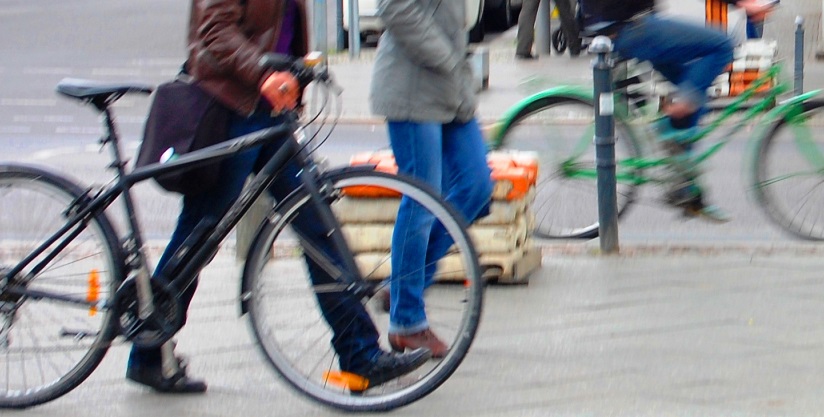
ECF participates in exciting EU-funded projects
ECF is proud to collaborate with our members and take part in exciting EU-funded projects, some ongoing and some yet to be kicked off! Project topics include cycle tourism, urban mobility and capacity building for civil society organisations.
ECF's work on cycle tourism, aims at linking sustainable mobility with various green tourism strategies. In this spirit, the AtlanticOnBike project aims to achieve positive economic outcomes thanks to a transnational cycle tourism strategy. This strategy is based on the natural and cultural assets of the EuroVelo1, one of the fifteen long distance European cycle routes, the so called Atlantic Route. With Europe being the world’s leading destination for cycle tourism, this represents a great opportunity of green growth for the blue economy. AtlanticOnBike is a project with partners from France, Portugal, Ireland, Norway, UK, Spain. The MEDCYCLETOUR project goal is to use the EuroVelo 8 – Mediterranean Route, a long-distance cycling route that connects the whole Mediterranean from Cyprus to Cádiz, as a tool to influence regional and national policies in favor of sustainable and responsible tourism. This will provide transnational solutions in coastal areas across the Mediterranean. Partners from Cyprus, France, Spain, Italy, Slovenia, Croatia, Greece are taking part in this project. With similar goals in mind, Biking South Baltic Project focuses on improvement, promotion, connection and coordination of the natural and cultural tourist resources of South Baltic areas' coastal regions. The result is a cross-border, sustainable, well-recognized cycle tourism product: Baltic Sea Cycle Route Copenhagen-Gdańsk. Building cross-border cooperation in the field of cycling tourism between South Baltic countries will increase the sustainability of tourism in the whole region. The project involves partners from Poland, Germany and Denmark.
All three projects were kicked-off in spring 2017. You can find more information on the official EuroVelo website.
ECF is also involved in two projects aimed at improving urban mobility policies. FLOW’s goal is to put walking and cycling on an equal footing with motorized modes as a solution to tackle urban congestion. In the project a user-friendly methodology will be developed. This will traffic modelling to assess the effectiveness of walking and cycling measures. FLOW targets cities, businesses and decision-makers with the aim of shifting the way these groups think about and act on the potential for non-motorized transport to reduce congestion. National partners from Germany, Belgium, UK, Hungary, Poland, Ireland, Portugal and Bulgaria are involved in this project. You can find more information on the FLOW's page. The CHIPS project on the other hand, will develop and promote cycle highways as an effective and cost efficient low carbon solution for commuting towards and from urban employment poles. CHIPS will demonstrate that, especially in combination with the growing number of e-bikes, cycle highway innovation can effectively get commuters out of their cars. Partners from Belgium, Netherlands, Denmark and UK are taking part in the CHIPS project. For more information please visit the project’s website.
Understanding the importance of capacity building in civil society, ActiveVoice project’s goal is to lead civil society organizations to pursue active and cross-sector advocacy for the EU Physical Activity (PA) Guidelines. For a successful implementation of the EU Physical Activity Guidelines it’s crucial to involve civil society organizations in the process. However, the current capacity of the organizations is not sufficient to play an effective role in policy making. Therefore the project aims to build the capacity of the civil society organizations involved in HEPA. National partners from Bulgaria, Poland, France, Greece and Italy are involved in the Active Voice project. For more information you are invited to have a look on the project’s page.
The last project is concerned with research into the value of travel time. MoTiV addresses emerging needs and perspectives on Value of Travel Time (VTT). This is a particularly valuable research area to decision-makers, transportation planners, engineers, and economists in the context of projects aiming at enhancing transportation infrastructure. MoTiV’s main goal is to contribute to advanced research on VTT by introducing and validating a conceptual framework for the estimation of VTT through a European-wide data collection. The data will be gathered through the MoTiV smartphone app, which combines and integrates in an innovative way features from a multi-modal “journey planner” and an “activity/mobility diary”. Partners from Slovakia, Finland, Belgium, Spain, Switzerland and Portugal are taking part in this project. The project will be kicked-off in the following weeks! Please visit the the website for more information.
Contact the author
Recent news!
Upcoming events
Contact Us
Avenue des Arts, 7-8
Postal address: Rue de la Charité, 22
1210 Brussels, Belgium









